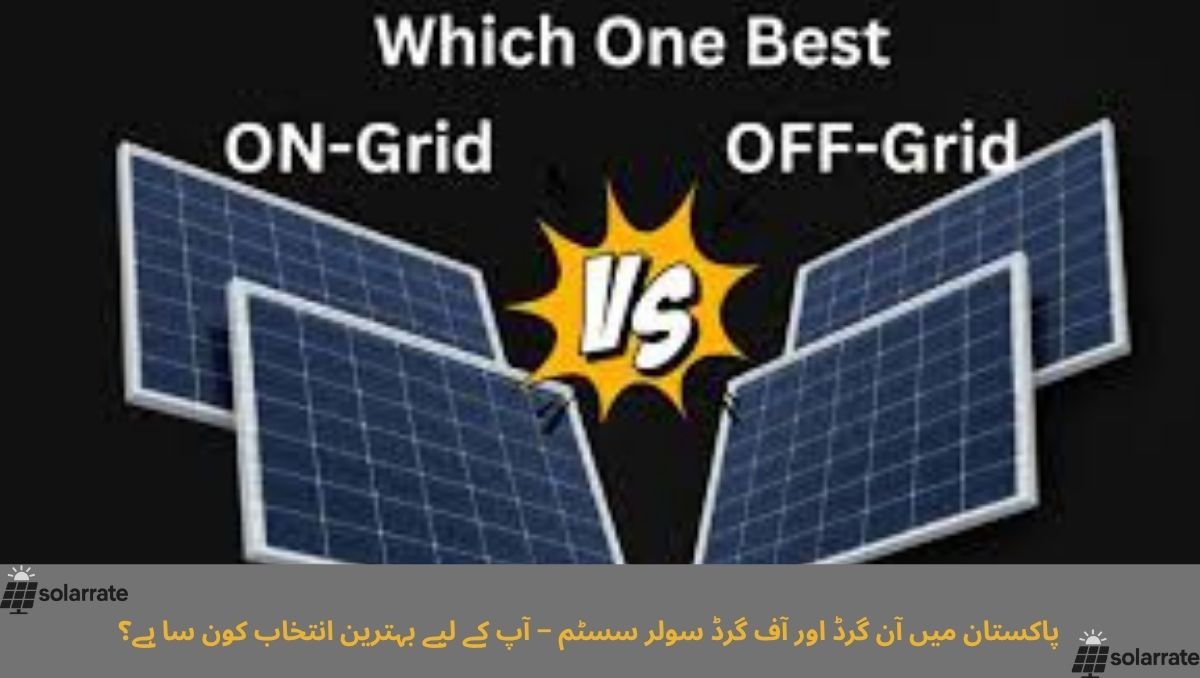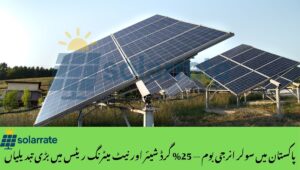As electricity prices continue to rise, more people in Pakistan are turning to solar power to reduce their monthly energy bills—and it’s a smart and sustainable choice. When it comes to installing a solar system, homeowners and businesses typically choose between three main types: on-grid, off-grid, and hybrid systems.
An on-grid solar system is connected to the national electricity grid, allowing users to benefit from solar energy during the day while relying on grid electricity when solar production is low. On the other hand, an off-grid system operates completely independently, using battery storage to supply power even at night or during outages. A hybrid system combines the features of both, offering solar energy generation along with the reliability of backup power when needed.
Choosing the right system depends on several factors, including your location, power consumption, and budget. In this guide, we’ll help you understand the differences between On-Grid vs Off-Grid Solar System in Pakistan, so you can make the best decision for your energy needs.
Visit Now:https://cmsolarscheme.punjab.gov.pk/

On-Grid vs Off-Grid Solar System in Pakistan:
⚡ On-Grid Solar System: This system is connected to the national electricity grid. It allows you to use solar energy during the day and automatically switches to grid power when solar production is low. It’s ideal for urban areas with reliable grid access and helps reduce electricity bills significantly.
🔋 Off-Grid Solar System: This setup works independently without any connection to the grid. It stores excess solar energy in batteries for use at night or during cloudy days. It’s perfect for remote locations or areas with frequent power outages, but it usually requires a higher upfront investment due to battery costs.
How does it work?
🔌 At its core, an on-grid solar system works alongside your existing electrical grid. The solar panels on your roof capture the sun’s energy and convert it into electricity. This electricity is then fed directly into your home’s electrical system to power your appliances.
🌥️ Now, what happens when the sun isn’t shining? That’s where the grid comes into operation.
📥 When your solar panels aren’t producing enough electricity to meet your needs, your home will draw power from the grid, ensuring you always have the energy you need.
💰 And the best part? By connecting to the grid, your on-grid solar system can send excess electricity back to the utility company.
📊 This means you can earn credits (units sold to WAPDA) through net metering, which can reduce your monthly electricity bills — making this system ideal when comparing options in the On-Grid vs Off-Grid Solar System in Pakistan.
Read More:Top 10 Best Solar Panels in Pakistan – Top Brands & Prices
Net Metering:
🔄 In simple terms, net metering is a billing mechanism that allows you to get credit for the excess electricity your solar panels generate and send back to the grid. This system helps reduce your electricity bills and is an important feature when choosing between On-Grid vs Off-Grid Solar System in Pakistan.
Components of On-Grid Solar System:
☀️ Solar Panels: The heart of the system, converting sunlight into electrical current. The number and size depend on your energy needs and roof space.
🔄 Grid-tied Inverter: Converts DC electricity from solar panels into AC electricity used by your home. It includes safety features like anti-islanding protection to keep your system safe when the grid is down.
📊 Green Meter: Monitors electricity flow, measuring what you produce and consume from the grid.
⚡ Electrical Panel: Your home’s main panel must be upgraded to safely integrate the solar system with the grid.
These components are key to understanding the On-Grid vs Off-Grid Solar System in Pakistan and choosing the right setup for your energy needs.
Advantages of On-Grid Solar System:
💸 Reduced electricity bill: This system lets you generate and use your own electricity, and when your energy needs are low, you can sell the excess back to WAPDA through net metering. The result? A significantly reduced electricity bill every month.
⚡ Reliable power source: Thanks to the grid connection, you’ll have a steady power flow even when the sun isn’t shining, ensuring uninterrupted energy for your home or business.
Limitations of On-Grid Solar System:
⚠️ Grid dependent: On-grid solar systems rely entirely on the electrical grid. If there’s a power outage in your area, your solar panels won’t be able to supply electricity, leaving you and your neighbors in the dark — a serious inconvenience, especially during hot summer months.
📉 Net metering policies: You remain subject to the utility company’s (discos) rules and regulations. They control the payback rates for the electricity your solar panels generate, which means changes in net metering rates could happen anytime, potentially reducing your solar investment’s financial benefits.
These limitations are important to consider when comparing options in the On-Grid vs Off-Grid Solar System in Pakistan debate.
Off-Grid Solar System:
How does it work?
🔌 Here, there is no grid connection like in an on-grid setup. The direct current (DC) from the solar panels is fed into a battery, where it is stored for later use. When you need to power your home, the stored energy is converted to alternating current (AC) electricity using an inverter. This electricity can then run your lights, appliances, and other electrical devices. In this off-grid setup, there is no connection to the electrical grid, which is a key difference in the On-Grid vs Off-Grid Solar System in Pakistan discussion.
Components of off-grid solar system:
🔆 Solar panels convert sunlight into DC electricity. An off-grid inverter changes it to AC for your home. A battery stores extra energy for night use. A transfer switch ensures safe power switching, and a charge controller protects the battery. This setup is key in understanding On-Grid vs Off-Grid Solar System in Pakistan.
Advantages of off-grid solar system
⚡ Energy independence: An off-grid solar system generates your own renewable electricity, freeing you from grid reliance.
🔋 Reliability: Off-grid solar systems aren’t affected by load shedding and keep your home powered.
These benefits highlight why many choose On-Grid vs Off-Grid Solar System in Pakistan based on their needs.
Limitations of off-grid solar system
⚠️ Limited power capacity: Off-grid systems are usually smaller and may not support large homes with high electricity needs.
💸 Increased cost: Maintenance of batteries, inverters, and other parts adds extra cost and effort compared to on-grid systems.
These are key considerations when choosing On-Grid vs Off-Grid Solar System in Pakistan.
Read More:Latest Solar Panel Prices in Pakistan – 27 June 2025 Daily Market Update
Hybrid Solar System:
How does it work?
⚡ A Hybrid Solar System combines the advantages of both on-grid and off-grid setups, providing the best of both worlds.
🌞 During the day, solar panels power your home and charge the battery bank with any excess energy.
🌙 At night or on cloudy days, your home runs on stored battery power for uninterrupted electricity.
🔄 If the batteries run out, the system automatically switches to the main grid, ensuring constant power supply.
This makes the On-Grid vs Off-Grid Solar System in Pakistan debate easier with the hybrid option.
Components of Hybrid Solar System:
🔆 Solar Panels: The essential component that converts sunlight into electricity for your system.
🔋 Battery Bank: Stores excess electricity generated during the day for later use.
⚡ Charge Controller: Protects and safely manages the battery charging process.
🔌 Hybrid Inverter: Combines on-grid and off-grid inverter functions, managing power from solar panels, batteries, and the grid seamlessly.
📊 Monitoring Equipment: Tracks the performance and health of your solar and storage system.
This setup is key to understanding the On-Grid vs Off-Grid Solar System in Pakistan and how hybrid systems optimize energy use.
Advantages of Hybrid Solar System:
🔒 Increased Reliability: A hybrid system combines the best features of on-grid and off-grid solar systems, ensuring you have a reliable power source even during load shedding, cloudy days, or when batteries run out.
💰 Cost Savings: Although the initial cost may be higher, a hybrid system offers long-term savings on electricity bills, making it a smart choice for anyone exploring On-Grid vs Off-Grid Solar System in Pakistan.
Limitations of Hybrid Solar System:
💸 High Initial Cost: The main drawback of a hybrid system is its higher upfront investment. Setting up a hybrid system requires solar panels, grid connection, and battery backup, which makes it more expensive initially compared to other options in the On-Grid vs Off-Grid Solar System in Pakistan discussion.
Community Solar System:
🌞 One option you may not be familiar with is community solar. In this model, a solar farm is built by a developer, and residents in the community can subscribe to it to enjoy the benefits of solar power without installing panels on their roofs.
💸 Community solar subscribers pay a monthly or annual subscription fee that helps cover the costs of building and maintaining the shared solar array. Typically, this fee is lower than what you’d pay for electricity from your utility, allowing you to save money on your power bills.
🌍 While community solar is already popular in countries like the US and Germany, it’s an exciting concept that could soon emerge as a practical solution in Pakistan, complementing the choices in the On-Grid vs Off-Grid Solar System in Pakistan debate.
🏠 It’s especially great for homeowners with unsuitable roofs or renters who want to access clean, affordable solar energy.
Ground-Mounted Solar System:
🌞 If you’re a homeowner or businessman in Pakistan facing limited roof space or shading problems, a ground-mounted solar system could be the ideal solution for you.
🛠️ Unlike rooftop panels, ground-mounted solar panels are installed on a sturdy frame placed directly on the ground. This setup allows the panels to be oriented perfectly to capture the maximum sunlight, boosting energy production.
🧼 Additionally, ground-mounted panels are easier to clean and maintain compared to those on rooftops, ensuring better long-term performance.
📏 While this system requires more land area, if you have the space, it’s an excellent option to consider when exploring the On-Grid vs Off-Grid Solar System in Pakistan choices.
Read More:CM Punjab Solar Energy Initiative 2025 – Light Up Your Home Without Bills
Which Solar System is the best fit for you?
| System Type | Choose If |
|---|---|
| ⚡ On-Grid Solar System | You live in an area with reliable grid access (less load-shedding), such as urban portions of big cities like Lahore, Karachi, and Islamabad. You want to lower your electricity bill using an On-Grid Solar System in Pakistan. |
| 🔋 Off-Grid Solar System | You live in rural areas with limited or no access to the grid, such as villages of South Punjab, KPK, and Sindh. You are a farmer with a small agricultural setup (e.g., Attock, Rawalpindi, Chakwal). You prefer energy independence using an Off-Grid Solar System in Pakistan. |
| ♻️ Hybrid Solar System | Your area faces frequent power outages or limited grid access, such as towns in Multan, Bahawalpur, Peshawar, and Quetta. You want both grid connectivity and backup batteries by choosing a Hybrid Solar System in Pakistan. |
Conclusion:
In conclusion, choosing the right solar solution depends on your location, energy needs, and budget. Whether you opt for an on-grid, off-grid, hybrid system, or even community solar, each option offers unique benefits for clean and cost-effective energy. Understanding the On-Grid vs Off-Grid Solar System in Pakistan will help you make an informed decision that maximizes savings and reliability. As solar technology advances and awareness grows, adopting solar energy in Pakistan is becoming easier and more rewarding than ever.
FAQS:
What is the main difference between on-grid and off-grid solar systems in Pakistan?
On-grid solar systems connect to the national grid allowing excess energy to be sold back, while off-grid solar systems store energy in batteries and work independently. This is a key point in the On-Grid vs Off-Grid Solar System in Pakistan comparison.
Which system is best for areas with frequent power outages in Pakistan?
For regions with regular load shedding, off-grid or hybrid systems are preferred as they provide energy storage and do not rely solely on the grid. This is important when deciding between On-Grid vs Off-Grid Solar System in Pakistan.
Can I convert my on-grid system to off-grid later in Pakistan?
It is possible but requires additional equipment like batteries and hybrid inverters. Considering this is crucial in the On-Grid vs Off-Grid Solar System in Pakistan discussion.
Is net metering available for all on-grid solar systems in Pakistan?
Net metering is generally available but depends on local utility companies’ rules. This factor influences the choice in the On-Grid vs Off-Grid Solar System in Pakistan debate.



